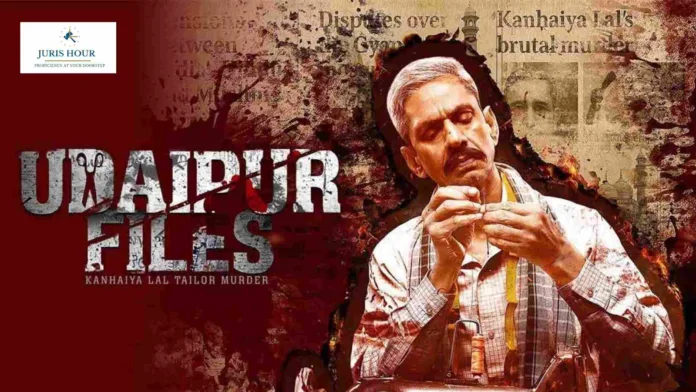The Delhi High Court has declined to grant an interim stay on the release of the film “Udaipur Files: Kanhaiya Lal Tailor Murder”, rejecting the plea of petitioner Mohmmed Javed — an accused in the ongoing criminal trial related to the murder — who claimed that the movie’s release would prejudice his right to a fair trial.
A Bench of Chief Justice Devendra Kumar Upadhyaya and Justice Tushar Rao Gedela held that once the Central Board of Film Certification (CBFC) has certified a film — after mandated cuts and compliance with guidelines — there exists a legal presumption of validity. The court noted that the film had undergone 55 cuts directed by the CBFC and an additional five voluntary edits by the producers, along with a revised disclaimer suggested by the Union government.
Senior Advocate Dr. Menaka Guruswamy, appearing for Javed, argued that the film’s title and content are directly connected to the case in which the petitioner is accused (Accused No. 8) and that dialogues in the movie closely mirror the chargesheet. She submitted that its public exhibition could influence witnesses, court staff, and even the trial environment, thereby infringing the petitioner’s fundamental right to a fair trial under Articles 14 and 21 of the Constitution.
Additional Solicitor General Chetan Sharma, representing the Union of India, opposed the plea, stressing that the CBFC’s decision followed a statutory process involving subject experts. He argued that judicial review of such certification is limited and that the film, in its certified form, posed no threat to public order or fairness of trial.
Senior Advocate Gaurav Bhatia, for the film’s producers, added that the petitioner’s name or role is not mentioned anywhere in the movie and that the message of the film promotes social harmony rather than vilification of any community. He cautioned that delaying the release — slated for August 8, 2025, with tickets already sold — would cause significant financial harm, given that the next available exhibition slots in cinemas would be after six months.
Relying on precedents including Viacom 18 Media v. Union of India and S. Rangarajan v. P. Jagjivan Ram, the Bench held that:
- Freedom of expression through cinema cannot be curtailed unless the anticipated danger is proximate, real, and intrinsically dangerous to public interest.
- Judges, by their professional training, are not expected to be influenced by films or media broadcasts (Zee News v. Navjot Sandhu).
- The doctrine of sub judice cannot be extended to negate free speech merely because of references to ongoing cases (Adarsh Cooperative Housing Society v. UOI).
The Court concluded that the petitioner failed to establish:
- Prima facie case — No direct nexus between the film’s exhibition and prejudice to the trial.
- Balance of convenience — Favoured the producers due to the substantial investments and imminent release.
- Irreparable loss — No demonstrable harm that could not be remedied later.
The High Court refused to halt the release, stating:
“The petitioner has failed to establish that any irreparable loss is going to be caused to him in case the release of the film is not stayed.”
The court also deferred the petitioner’s request for a special screening for the Bench, stating it would be considered during final hearing on October 16, 2025.
The film, based on the 2022 killing of Udaipur tailor Kanhaiya Lal, will now hit theatres nationwide on schedule tomorrow.
Case Details
Case Title: MOHMMED JAVED Versus UOI
Case No.: W.P.(C) 11876/2025, CM APPL. 48480/2025 & CM APPL. 48481/2025
Date: 07.08.2025
Counsel For Petitioner: Dr. Menaka Guruswamy, Sr. Advocate
Counsel For Respondent: Chetan Sharma, ASG
Read More: Criminal Allegations Don’t Bar Arbitration In Fraud Cases: Supreme Court



